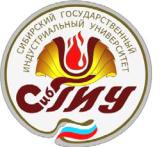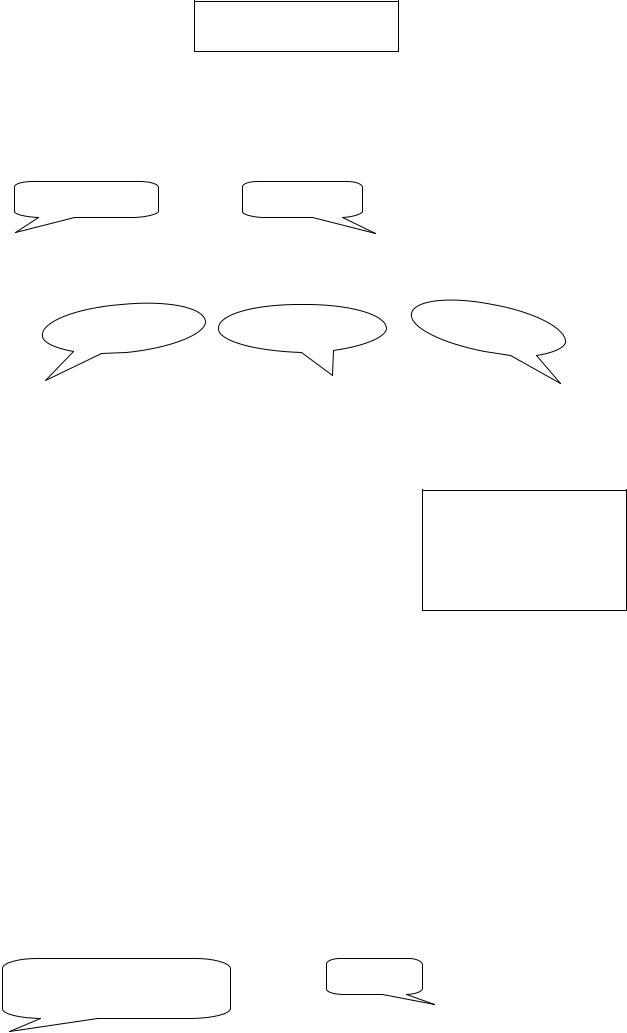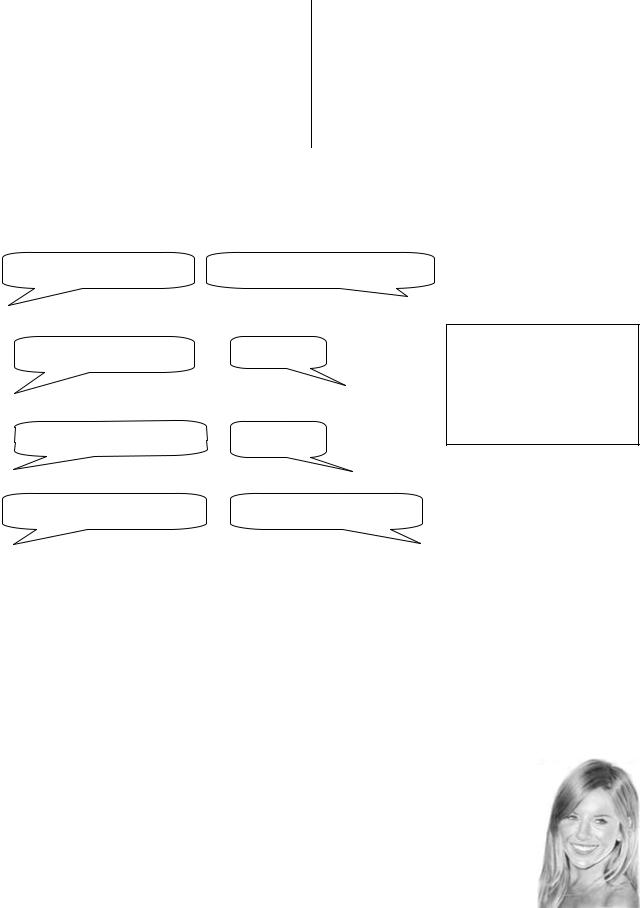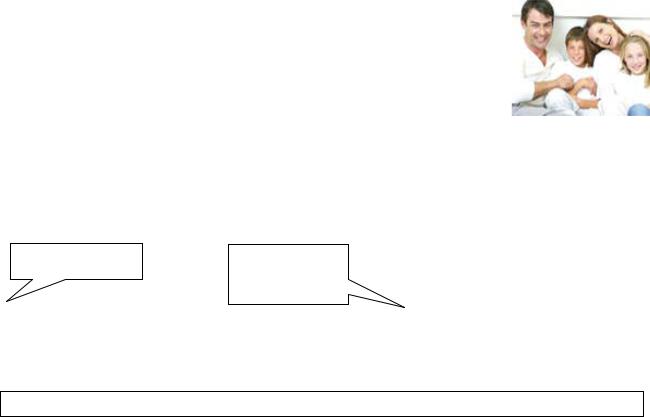
my family and me
.pdf
Институт экономики и менеджмента
Кафедра иностранных языков
My Family
and Me
Методические указания
Новокузнецк
2012
Министерство образования и науки Российской Федерации
Федеральное государственное бюджетное образовательное учреждение высшего профессионального образования
«Сибирский государственный индустриальный университет»
Кафедра иностранных языков
My Family and Me
Методические указания по организации практических занятий
и самостоятельной работы студентов 1 курса, изучающих английский язык
Новокузнецк
2012
1
ББК 81.2 Англ - 9 M99
Рецензент
кафедра иностранных языков НФИ КемГУ (зав. кафедрой к. пед. н., доцент Н.В. Падеро)
M99 My Family and Me. : метод. указ. / Сиб. гос. индустр. ун-т ;
сост. Л.И. Фенстер. – Новокузнецк : Изд. центр СибГИУ, 2012. – 17 с.
Представлен материал для проведения двух практических занятий (4 академических часа) по теме «My Family». Даны устные упражнения и тексты, направленные на формирование у обучающихся коммуникативной компетенции, позволяющей осуществлять общение на иностранном языке. Также предлагаются задания для самостоятельной работы студентов.
Предназначены для студентов первого курса, изучающих английский язык.
2

ПРЕДИСЛОВИЕ
Методические указания разработаны в соответствии с Программой учебной дисциплины «Иностранный язык», принятой в Сибирском государственном индустриальном университете согласно ФГОС для бакалавров неязыковых направлений подготовки.
Предполагается, что методические указания «My Family and Me», составленные на основе коммуникативного подхода к обучению иностранному языку, помогут преподавателям организовать практическую работу со студентами первого курса по теме «Семья».
Особенностью и одним из непременных условий осуществления коммуникативного подхода является постоянная коммуникативная ориентация на устную речь: чем больше упражнения похоже на реальное общение, тем лучше. Изучение грамматики ни в коем случае не исключается, но и грамматические упражнения составляются с учётом речевой задачи. Понятие «коммуникативность» предполагает, что слова и грамматические формы усваиваются при моделировании конкретных речевых ситуаций – студент выражает мысль, соглашается с услышанным, спрашивает о чем-то, побуждает собеседника к действию, а в процессе этого запоминает необходимые слова или грамматические формы. Эта же коммуникативная цель ставится и при чтении текстов. Важным фактором вышеназванного подхода в процессе обучения чтению являются прагматическая направленность, тематический подбор текстового материала и личностная ориентация.
По учебному плану, тема “My family” изучается на двух первых занятиях (4 академических часа) в первом семестре. В данных методических указаниях разработан примерный план проведения этих занятий, а также предложены упражнения для самостоятельной работы студентов.
To be
To have
3

Personal Pronouns
Possessive Pronouns
LESSON 1
1. Say your names.
I’m Alex. |
I’m Olga. |
2. Say your names in alphabetical order.
III’m Andrew. |
I’m Boris. |
I’m Cathie. |
3. Read the dialogues. Then practise them with a partner using other names.
A Hello, I’m Helen. What’s your name? |
Grammar Focus |
B My name’s Irene. |
name’s = name is |
A Hello, Irene. |
what’s = what is |
|
I’m = I am |
AHello, my name’s Max. What’s your name?
BMary.
AWhere are you from, Mary?
BI’m from Manchester.
4. Write the conversation. Then listen to your teacher and check.
AHello, ___________ Liza. What’s ________ name?
B____________ Nick.
A____________ from, Nick?
B______________ Prague. Where __________ from?
A______________ Paris.
5. Talk to the students in the class.
Hello, my name’s ___ . |
4 |
Mark. |
What’s your name? |
|
|

Where are you from, Mark? |
I’m from ____ . |
6.Fill in the gaps with am, is, are.
1.I ___ from London.
2.He ___ from Prague.
3.She ___ from Vienna.
4.It ___ from Moscow.
5.You ___ from Paris.
6.We ___ from Berlin.
7.They ___ from St. Petersburg.
7.Complete the sentences with am, is, are.
1.My name ___ Ann.
2.Where ___ you from?
3.I ___ from England.
4.What’s her name? Her name __ Ada.
5.Bill and Sam __ from New York.
6.He is my friend. His name _ Max.
7.Where __ she from?
8.This _ my dad. His name _ Bob.
9.She _ interested in computers.
10.They _ good at languages.
11.What _ she? She _ a nurse.
8. Introduce yourself to the class. Tell the classmates what your name is, how old you are, what you are good at and what you are interested in.
Hi, I’m Peter. I’m 18 years old. I’m interested in computers and cooking. I think I’m good at maths and sports.
9. Read about Margaret. Then answer the questions.
5

My name’s Margaret Pendleton. I’m from Oxford. I’m a student at university. I’m not married but I have a boyfriend. He is a graphic designer.
My friends say that I’m easy-going and generous. I’m fond of dancing and singing. I’m very happy and my life slogan is:
Don’t Worry, Be Happy!
1.What’s her surname?
2.Where’s she from?
3.What’s she?
4.Is she married?
5.What kind of person is she?
6.What’s she fond of?
7.Is she happy?
8.What’s Margaret’s life slogan?
10.Write about you. Then read it to the class. If necessary, use suitable adjectives and a slogan from the lists below.
Adjectives to describe your character:
ambitious – амбициозный |
|
|
easy-going – добродушный |
|
purposeful – целеустремленный |
|
|
selfish – эгоистичный |
|
generous – великодушный |
|
|
independent – независимый |
|
hardworking – трудолюбивый |
|
|
modest – скромный |
|
persistent – упорный |
|
|
reliable – надежный |
|
reserved – замкнутый, сдержанный |
|
|
cheerful – веселый |
|
kind – добрый |
|
|
sociable – общительный |
|
lazy – ленивый |
|
|
impudent – нахальный |
|
Life slogans: |
|
|
|
|
1. |
Just do it! |
|
12. Look for similarities rather than |
|
|
||||
2. |
Think differently! |
|
|
differences. |
3. |
Live and let live. |
|
13. Be all you can be. |
|
4. |
Stick with the winners. |
|
14. You can not do great things; only |
|
5. |
This too shall pass. |
|
|
small things with great love. |
6. |
Share the wonder of the world. |
|
15. Double your pleasure, double |
|
6

7.Change is a process, not an event.
8.All is for the best.
9.Enjoy life!
10.Follow your heart.
11.Take the cotton out of your ears and put it in your mouth.
your fun.
16.Good things come to those who wait.
17.The road will never be the same.
11. Ask and answer questions with a partner about the students in your class.
Where’s he from? |
Novokuznetsk, Russia. |
What’s his name? |
Max. |
What’s her name? |
Liza |
Grammar Focus he’s = he is she’s = she is
they’re = they are
Where’s she from? |
She’s from Norilsk. |
12. |
Complete the table. |
|
|
|
|
|
|
||
|
|
|
|
|
|
|
|
|
|
Who/What? |
I |
|
you |
he |
she |
it |
we |
they |
|
Whose? |
my |
|
|
|
|
|
our |
their |
|
13. |
Read about Julia. Translate the word combinations given in italics. |
||||||||
Her name’s Julia McBride. She’s not married, but her family is big: mother, father and two younger sisters. Their house is in the village. Julia is a cook in a local pub. Her pub is in the centre of the village. Julia’s sisters say: “Our family is very friendly, we are happy together”. They have close friends because Julia and her sisters are sociable and generous.
GRAMMAR FOCUS
7
To be
|
|
|
+ |
|
? |
|
▬ |
|
|
I am a student. |
|
Am I a student? |
I am not a student. |
||||
|
You are a student. |
|
Are you a student? |
You are not (aren’t) a |
||||
Present |
|
|
|
|
|
student. |
||
He (she, it) is a student. |
Is he (she, it) a |
He (she, it) is not |
||||||
|
||||||||
|
|
|
|
|
student? |
(isn’t) a student. |
||
|
We |
(you, |
they) |
are |
Are we (you, they) |
We (you, they) are not |
||
|
students. |
|
|
students? |
students. |
|||
|
I (he, she, it) was a |
Was I (he, she, it) a |
I (he, she, it) was not |
|||||
Past |
student. |
|
|
student? |
(wasn’t) a student. |
|||
We |
(you, |
they) |
were |
Were we (you, |
We |
(you, they) were |
||
|
||||||||
|
students. |
|
|
they) students? |
not (weren’t) students. |
|||
|
I (he, she, it) will be a |
Will I (he, she, it) |
I (he, she, it) will not |
|||||
Future |
student. (I’ll be) |
|
be a student? |
be |
(won’t be) a |
|||
We (you, they) will be |
Will we (you, they) |
student. |
||||||
|
||||||||
|
students. (We’ll be) |
be students? |
We (you, they) will not |
|||||
|
|
|
|
|
|
be (won’t be) students. |
||
В будущем времени (Future Simple) употребляется также вспомогательный глагол shall c местоимениями I и we: We shall see.
14.Make sentences with the verb to be.
1.I __ 18 years old.
2.I __ 15 three years ago.
3.My family __ not very big.
4.Our flat __ in the centre of the city.
5.We ___ ___ married yet.
6.Last year his uncle ___ 45 years old.
7.My mother and father ___ at work.
8.I __ __ an engineer in four years.
9.Mark ___ a sociable boy at school.
10.__ you __ a programmer after you graduate from university?
11.___ they married in 2008?
12.Alex ___ ___ her brother, he __ her boyfriend.
13.Maria’s mother ___ in her office at 12 o’clock yesterday.
14.I __ ___ at home now. I __ at the lesson.
8

15.They __ __ __ happy together because they are different: she __ modest and he __ ambitious.
15.Complete the information about your friend and read it to the class.
His/her name’s ________ and he’s/she’s a ________. He’s/she’s from
______. He’s/she’s not ______. He’s/she’s fond of _________. His/her friends think he’s/she’s ______ and _____. His/her life slogan is:
___________________________________!
LESSON 2
1. Write these words in the correct place. Read them aloud.
|
Brother father daughter wife aunt |
grandma |
nephew |
|
||||||
|
|
|
|
|
|
|
|
|
||
boyfriend |
husband |
|
son |
|
uncle |
|
grandpa |
|
||
girlfriend |
|
mother |
|
sister |
|
|
|
niece |
||
2. Read about Dan and his family. Then ask your classmate questions about them. Let him/her answer your questions.
This is a family photo of Dan, his wife Alice and their two children. They have a nice house. Dan is an engineer. He has a very good job at a factory. It is not in the centre of town. Alice is a school teacher, she has a part-time job at school. They have a son, his name’s Andrew, and a daughter, her name’s Cindy. Andrew is 10 years old, he’s a schoolboy. Cindy is 15 and she is a schoolgirl. They have a dog and a cat. The family is very friendly. When they’re together, they have a good time.
Who’s Alice? |
She’s Dan’s |
|
wife. |
3. Write the names of people in your family. Ask and answer questions with a partner.
Ann, Kate, Boris, Max, Alexander, Denis, Steve, Mark, Maria, Helen.
9
